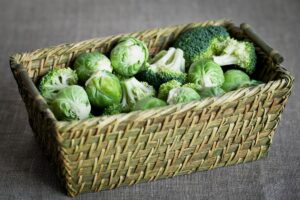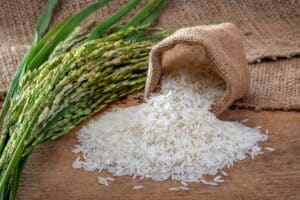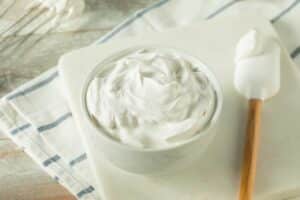If you’re not adept at using dairy ingredients in cooking, you might be wondering what the difference between yogurt and sour cream is.
The major difference between yogurt and sour cream is in the fat content and consistency.
Yogurt is lower in fat than sour cream, which makes them different in the overall texture — sour cream is thicker, while yogurt is more runny.
Nevertheless, they both help you make fluffy, light-baked foods.
But before you swap one for the other in a recipe, let’s discuss their ingredients, nutritional profile, health benefits, and cooking ratios.
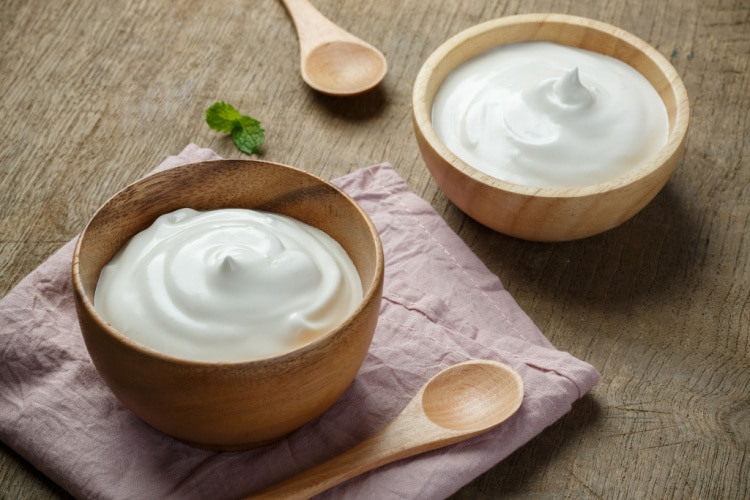
Difference Between Sour Cream and Yogurt
Yogurt has a fat content of 10–12%, compared to 20% for sour cream.
Yogurt is made by fermenting milk, while sour cream is made by fermenting any type of cream, most often heavy cream.
The fermentation process for yogurt includes microorganisms like Lactobacillus Bulgaricus and Streptococcus Thermophilus, whereas sour cream is made with Lactococcus Lactis.
Sour cream is thicker, tangy, and acidic, whereas yogurt is sour, tangy, and more watery in texture.
Yogurt has a two-week shelf life, while sour cream may survive for up to three weeks!
Sour Cream vs Yogurt Comparison Table
| Category | Sour Cream | Yogurt |
| Fat Content | 20% | 10–12% |
| Ingredients | Heavy Cream | Milk |
| Fermentation microorganisms | Lactococcus Lactis | Lactobacillus Bulgaricus & Streptococcus Thermophilus |
| Taste | Acidic & tangy | Sour & tangy |
| Texture | Thick & creamy | Thin & watery |
| Shelf Life | 3 weeks | 2 weeks |
Nutritional Content Breakdown: Which One Is Healthier?
Both sour cream and yogurt have health benefits thanks to their nutritional content.
But if you’re wondering which one is healthier, the nutritional value of yogurt is better than sour cream. Let’s look at the table below to get a clearer picture.
| 100 g (3.5oz) | Sour Cream | Yogurt |
| Calories | 214 | 63 |
| Fat | 20.96g | 1.55g |
| Carbs | 4.27g | 7.4g |
| Fiber | 0g | 0g |
| Sugar | 0.16g | 7.04g |
| Protein | 3.16g | 5.25g |
| Cholesterol | 59mg | 13mg |
| Vitamins & Minerals | ||
| Sodium | 53mg | 70mg |
| Calcium | 141mg | 110mg |
| Iron | 0.06mg | 0.07mg |
| Magnesium | 11mg | 11mg |
| Phosphorous | 0.7mg | 1mg |
| Potassium | 211mg | 141mg |
| Zink | 0.7mg | 1mg |
| Vitamin B1 | 0.04mg | 0.023mg |
| Vitamin B2 | 0.24mg | 0.278mg |
| Vitamin B6 | 0.02mg | 0.063mg |
| Vitamin B3 | 0.07mg | 0.208mg |
| Vitamin B9 | 0.011mg | 0.007mg |
| Vitamin E | 0.4mg | 0.01mg |
Sour Cream vs Yogurt: Key Differences in Nutrition
In a nutshell, sour cream has less protein, fewer carbohydrates, and more fat than yogurt. On the other hand, yogurt contains 69% fewer calories and 3.5 times less cholesterol than sour cream.
Both sour cream and yogurt have similar quantities of sugar and comparable protein levels. Moreover, both have high levels of vitamin E and B vitamins.
Lastly, sour cream and yogurt are both high in calcium and contain comparable quantities of iron and potassium.
Can You Substitute Sour Cream for Yogurt?
You may easily switch between plain yogurt and sour cream, or vice versa, as long as you use the same amount of each in a 1:1 ratio.
You also need to remember that yogurt frequently has a tangier flavor than sour cream. Since yogurt contains less fat than sour cream, it should be added to sauces at the very end — when the heat is off — to avoid curdling.
Nonfat yogurt might differ significantly from sour cream since it often contains thickeners and stabilizers, and has a gritty taste. Therefore, it’s recommended that you stay away from it and don’t use this variety in recipes.
Greek yogurt made with whole milk has a texture and flavor most similar to conventional sour cream.
Plain yogurt may also be used, but it’s best to drain some of the liquid out of it first so that it thickens.
Health Benefits of Sour Cream & Yogurt
We mentioned that both products can be healthy, but let’s see how.
Yogurt and sour cream contain probiotics, which are good bacteria that live in the human stomach. Probiotics improve your body’s overall immunity and are excellent for gut health.
Studies show that probiotic-rich meals can prevent upper respiratory infections and flu-like symptoms in patients. Probiotics also help with the management of IBS and a number of other gastrointestinal disorders.
Additionally, the lactose-intolerant among you will probably find yogurt and sour cream to be more palatable than milk because both of them have a low lactose level.
Finally, sour cream and yogurt also contain calcium, which is essential for the development and maintenance of healthy bones and teeth. Calcium also contributes to the healing of wounds, maintaining healthy blood pressure, and preventing blood clotting.
What Is Sour Cream?
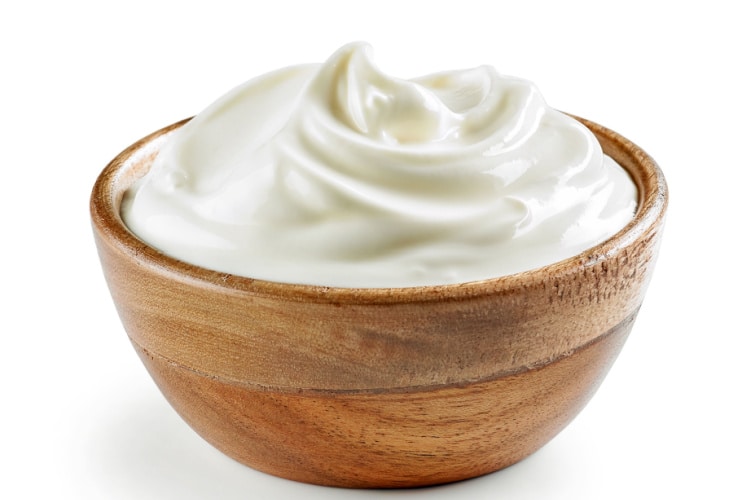
Sour cream is a dairy product made with at least 20% fat that has been cultured with some lactic acid bacteria. It is believed that the Russians created sour cream sometime in the 1600s, yet there’s no source that explicitly confirms this claim.
Sour cream has a silky texture and mildly sour flavor due to the acidity of the cream fermentation process. It can be found in popular cheesecake and cake recipes, and due to its high fat content, it gives baked goods a richer and lighter texture.
Apart from baking, sour cream can also be used as a garnish for mashed potatoes, creamy soups, or crunchy nachos. Rich spaghetti sauces or dips also benefit from sour cream.
What Is Yogurt?

Similar to sour cream, yogurt is a form of fermented dairy product with 10 to 12% fat. It’s made by combining bacterial culture with milk. Yogurt production has likely been going on for at least 4,500 years, so it’s by no means a new invention.
This dairy product has a stronger sour and acidic flavor that comes from the lactic acid that it contains. Its consistency ranges from creamy yet somewhat runny to stiff and pudding-like.
Yogurt activates baking soda in recipes, resulting in fluffy, moist, and light baked goods.
It can also be served cold with cornbread and pastries, mixed with fruit or jam, or added to soups, like tomato soup, marinades, and salad dressings.
Conclusion
Technically speaking, yogurt makes a great substitute for sour cream and vice versa. Why? Because they both have a sour taste and creamy texture.
The most accurate sour cream alternative is Greek yogurt. When switching out the two in recipes, check the cooking temperature before moving from sour cream to yogurt because the latter doesn’t handle high heat well.
Last but not least, if you’re being mindful of your diet and want to preserve your perfect health, you should always cook with yogurt rather than sour cream because yogurt contains much less fat and calories.


